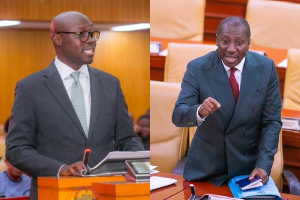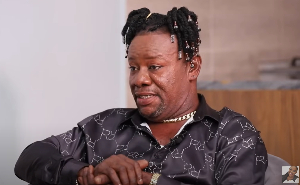“If only you were to me like a brother
Who was nursed at my mother’s breast,
Then if I found you outside
I would kiss you and no one would mind…”
These are not the lyrics of a “wiase ndwom.” These are words from the Song of Songs in the bible. And there are more. For whoever wrote Solomon’s Song of Songs appreciated the beauty of poetry and understood that poetry nourished the human soul. Song of Songs enriches the bible and its story of love adds to the politics, murder, miracles, adultery, magic and wars that grace the good book. For the bible is after all, a human story, with all the attendant strengths and weaknesses.
In times gone by, Ghanaian musicians, the poets that they were, sang about life as they experienced daily. So when Egya Koo Nimo remembered the experience of failing examinations in Europe, he wrote “Adesua ye ya.” When Kaakeku wrote “Driver nyi na meware no” where he claimed even a driver who was out of work could earn money as a bookman and this job security made them ideal husbands, Kwabena Onyina responded with “Ye no Waawa ma Yenkodo” where he extolled the virtues of farmers.
Every now and again when the “spirit” descended on them, Ghanaian musicians would sing in praise of their maker and his bountiful gifts to mankind. So for example, Bob Pinodo’s most popular song is “Eye me se, Mento Ndwom Nnyi Awuradze Aye”, though he was not usually a gospel singer. Every now and again, CK Mann, Nana Ampadu and Pat Thomas would depart from their usual styles and sing gospels. When you bought their albums, you were exposed to a variety of emotions that made the listening experience richer. Gospel music belonged to everyone. Nobody criticised them for singing gospel, for sinful as we all were, we understood, that they had as much right as anyone else to praise their maker and I am sure angels rejoiced in heaven whenever the musical platform was used to honour His name, irrespective of who the singer was.
My earliest recollection of gospel music as we have now was when Prof Kofi Abraham released great songs like Enkaa Akyi, Fa Wadesoa, Okwan Bi and Di kan Ma Mendi Wakyi in the seventies. His pioneering role inspired other gospel singers like Yaw Sarpong, Asiedu Teku and many others. Even then, gospel remained a minority genre. Then the great mushrooming of Evangelical Churches began as every bible school student got a vision that God wanted them to establish their own church. Ghanaians left the traditional churches in droves to attend these new churches that had a style in message and in worship that appealed to the youth.
Suddenly, it was not enough to have been baptised into churches that had been in existence for hundreds of years. For salvation, one ought to have made that crucial step towards a pastor to receive “the baptism of the holy spirit.” Suddenly, you were either with us and going to heaven or with them and going to hell. Suddenly, you were either one of us and listened to gospel or one of them and listened to “wiase ndwom” Sales in gospel music blossomed and a multi-million cedi industry was born.
The young reverends, bishops and evangelists, once they could as much as whistle a tune, joined the industry. Their titles lent some credibility to their records. Listening to their records became a religious experience and the financial rewards were enormous. So if the pastor could not sing, then maybe his wife, who would also often carry the title of Reverend, might be able to get an album out. Few missed this opportunity to make hay while the sun shone. Any churchgoer who could sing a bit and was able to save some money also made a gospel album. It did not matter whether they started going to church last week.
With a churchgoing community ever ready to fork out to assist Brother John or Sister Mary, a profit was almost always assured. Not having to face the harsh unpredictable reality of the music market however meant that often times quality was compromised. In fact gospel songs are the best-selling and yet the worse produced music one could hear on our airwaves. Not only that, whiles our hi-life and hip life artists invest large sums of money to make good videos, our gospel artist hardly see the need to do that and their typical video consists of the singer waving a white handkerchief by a fountain while Brother Kwesi and Sister Jennifer dance stiffly behind. Lack of competition breeds over-confidence and the Ghanaian music lover is the one who suffers.
I dare anyone listen to Prof Kofi Abraham’s albums in the seventies and compare with recent releases to see whether thirty years on, the quality has changed. In fact, the quality and musicianship on Prof Abraham’s records is much higher despite the vast improvement in studio facilities recently. Ghanaians are being taken for granted. People invest as little as possible in gospel and rely on the loyalty and sympathy of churchgoers to sell their records and make millions in profit.
Listen to Ghana Beats on a Sunday and try momentarily ignoring your Christian inclinations and the sympathies thereof and you would be surprised how bad the music is. Most of the songs sound the same and it soon becomes obvious that in most cases, these are people out to make a quick buck. Gospel lovers have no alternative but to put up with this. We have been indoctrinated to believe, that Ben Brako’s well-produced Baya album for instance is “wiase ndwom” even though the bible allows for expression of diverse emotions and the album actually addresses pertinent social issues.
Our experienced, talented and successful artists are no longer coming out with the occasional good gospel piece for fear of being ridiculed and accused of doing it “just for the money” Daddy Lumba’s “Mesom Jesus” – a brilliant song on all accounts was ridiculed. People could not reconcile the Lumba of “Obi ato me so boo” and the Lumba of “Mesom Jesus”. The churches have thus high jacked gospel music for good.
There is absolutely nothing wrong with people making a good living from ministering to their countrymen through song and I am sure every lyric is heartfelt and the personal lives of the singers are an example to us all. However, if people are going to be discouraged from listening to good conventional Ghanaian music such as is produced by Kojo Antwi, Ofori Amponsah, Dr Paa Bobo and Samini then the least that we’d expect is gospel music of similar quality. Unfortunately, at the moment, this is not forthcoming.
Opinions of Monday, 9 November 2009
Columnist: Gyesi-Appiah, Alexander


















